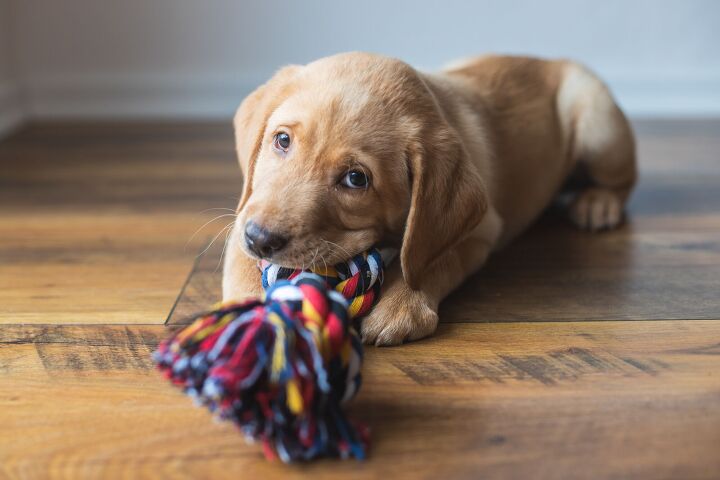How Can I Help My Puppy With Teething Pain?

As they are growing up, puppies are at their cutest – but this adorable phase isn’t without its challenges. Puppies grow fast and experience many important changes in a short timeframe – for instance, just like human babies, puppies will also pass through that dreaded teething phase. During the time when their adult teeth emerge – which is roughly between 12 and 16 weeks of age – they’ll feel pain and discomfort in their gums. As a result, they will want to chew on anything and everything, and might feel a bit down. What can you do to help ease the teething pain? Read on as we see the basics of caring for your puppy during this key part of growing up.
How To Help a Puppy During Teething
Teething is a natural process that puppies go through as they transition from their milk teeth (also known as puppy teeth) to their adult teeth. Just like human babies, puppies experience discomfort and sometimes pain during this phase. Teething typically begins around 3 to 4 months of age and continues until around 6 months, though the exact timing can vary among individual puppies and breeds.
During teething, puppies' gums may become swollen, red, and sensitive. They may exhibit behaviors like increased chewing, drooling, irritability, and reluctance to eat. It's essential to be patient and understanding during this period, as it can be a challenging time for both you and your puppy. Here are some tips to make this period easier and more comfortable:
- Provide Appropriate Chew Toys:
Give your puppy safe and durable chew toys specifically designed for teething. Rubber or nylon toys can help soothe their gums and provide a healthy outlet for their chewing instincts. This is a great example of a chew toy for puppies that helps alleviate teething discomfort – thanks to its textured surface, it will massage their gums and reduce their pain and irritation.
- Gentle Massage:
Gently massage your puppy's gums with your clean finger to provide some relief. This can help alleviate discomfort and increase blood circulation.
- Soft Food:
If your puppy is having trouble eating due to sore gums, you can temporarily switch to wet or softened dry puppy food. This can make mealtime less painful.
- Cold Treats:
Cold objects can help numb your puppy's sore gums. You can freeze a wet washcloth or a rubber toy and give it to your puppy to chew on. Just make sure the object isn't too hard to avoid damaging their teeth. Or, if you’re not too keen on DIY-ing it, you can always opt for specially designed teething toys that can be chilled in the freezer. Cool and comfy, they are a great relief, as they provide a chilling effect that is perfect for those sore, red gums your pooch is dealing with – such as these practical chew bones which are not only great because they can be frozen but for their textured surface, too.
- Supervision and Distraction:
Keep a close eye on your puppy and redirect their chewing to appropriate toys. This helps prevent them from chewing on inappropriate or potentially harmful objects. Make sure your puppy doesn't have access to items that could be harmful if chewed, such as shoes, electrical cords, or small objects that could be swallowed.
- Puppy Teething Gels:
Some over-the-counter teething gels made specifically for puppies can provide temporary relief. Consult your veterinarian before using any products to ensure they are safe for your puppy.
- Regular Veterinary Care:
Keep up with your puppy's regular veterinary checkups. Your vet can monitor their teething progress and offer advice or treatments if necessary.
- Patience and Comfort:
Sometimes, all your puppy needs is some extra love and comfort. Spend time cuddling, playing, and bonding with your puppy to help them feel better during this challenging phase.
Remember that teething is a temporary phase, and your puppy will eventually grow out of it. If you have concerns about your puppy's teething or if they seem to be in significant distress, it's always a good idea to consult your veterinarian for guidance and support.

A proud mama to seven dogs and ten cats, Angela spends her days writing for her fellow pet parents and pampering her furballs, all of whom are rescues. When she's not gushing over her adorable cats or playing with her dogs, she can be found curled up with a good fantasy book.
More by Angela Vuckovic

























